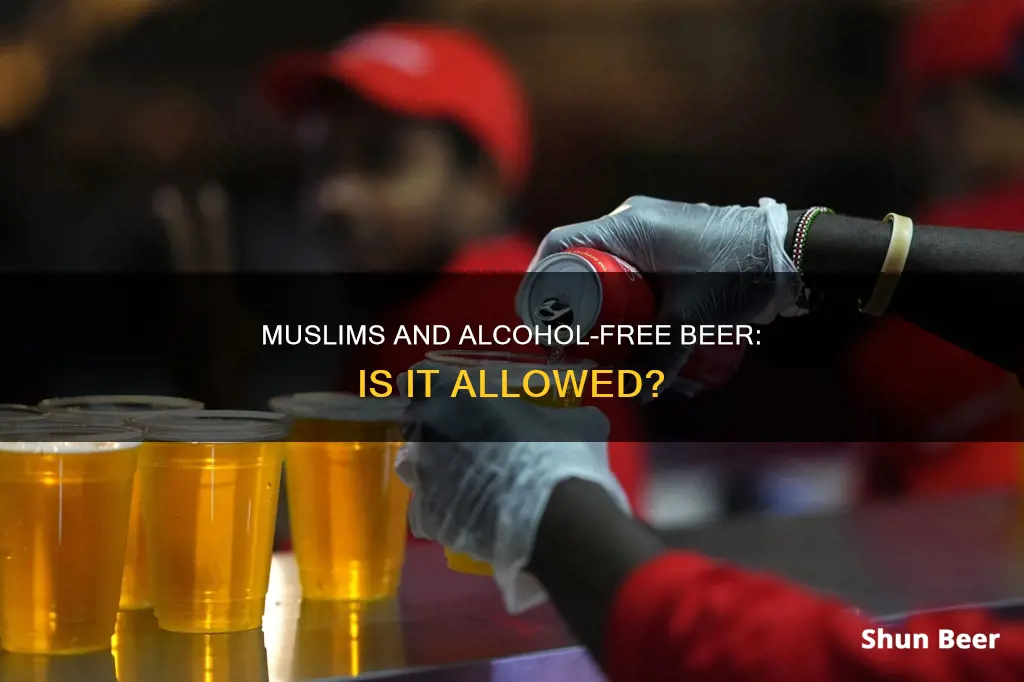
Alcohol is forbidden in Islam, and the question of whether non-alcoholic beer is permissible for Muslims is a complex one. The answer depends on several factors, including the amount of alcohol present, how the beverage is produced, and differing opinions among Islamic scholars.
The key reason alcohol is prohibited is due to its intoxicating effects, which are considered harmful and impure according to the Quran. As a result, anything that causes intoxication is not allowed in Islam. Non-alcoholic beer is typically brewed in the same way as regular beer, but with the alcohol removed or reduced, leaving a minimal amount of alcohol, usually less than 0.5% ABV.
Some Islamic scholars argue that non-alcoholic beer may be permissible, as the trace amount of alcohol is too low to cause intoxication and can be likened to other fermented foods like soy sauce or bread. However, other scholars take a more conservative approach, stating that even the smallest amount of alcohol should be avoided to steer clear of any grey areas.
The intention behind consuming non-alcoholic beer also comes into play, as some scholars suggest that drinking it with the intention of avoiding intoxication and simply enjoying the flavour may be permissible. Ultimately, the decision lies with the individual's interpretation of Islamic principles and their desire to uphold them.
| Characteristics | Values |
|---|---|
| Alcohol content | Non-alcoholic beers typically contain less than 0.5% ABV, with some containing up to 0.05% ABV. |
| Islamic ruling | There is no consensus among Islamic scholars. Some argue that non-alcoholic beers are permissible (Halal) due to the negligible amount of alcohol, while others suggest avoiding them entirely as even a small amount of alcohol is considered haram. |
| Production method | Non-alcoholic beers are produced similarly to regular beers, but with the alcohol removed or reduced through processes like de-alcoholisation or natural fermentation. |
| Consumption intention | The intention behind consuming non-alcoholic beer may be considered, with some scholars arguing that drinking it to avoid intoxication and enjoy the flavour may be permissible. |
| Certification | Some non-alcoholic beers have been Halal-certified by organisations such as Halal Australia and the Islamic Food and Nutrition Council of America. |
What You'll Learn
- Alcohol is forbidden in Islam due to its intoxicating effects, which are considered haram
- Non-alcoholic beer is produced similarly to regular beer, but with the alcohol removed or reduced
- Some Islamic scholars argue that non-alcoholic beer is permissible, as the trace amounts of alcohol are non-intoxicating
- Other scholars take a more conservative approach, stating that even the smallest amount of alcohol should be avoided to steer clear of any gray areas
- The intention behind consuming non-alcoholic beer may also be considered, with some scholars arguing that drinking it to avoid intoxication and enjoy the flavour could be permissible

Alcohol is forbidden in Islam due to its intoxicating effects, which are considered haram
The Quran states:
> "O ye who believe! Intoxicants and games of chance, and idols and divining arrows are an abomination of Satan’s handiwork. Leave it aside in order that ye may succeed." (Chapter V, Verse 9)
Another verse in the Quran states:
> "Indeed, Satan desires to incur enmity and hatred between you through intoxicants and gambling, and he desires to prevent you from God’s remembrance and prayer, yet will you, then give [them] up?" (Quran, 5: 91)
The Prophet Muhammad also forewarned against alcohol in the Quran, which Muslims believe to be the word of God. Muhammad thought that alcohol's potential for sin was "far greater" than its advantages.
The Islamic principle is that if a substance is haram, then any part of it is also haram. Therefore, non-alcoholic beers are considered haram by some Muslims, as they are produced in the same way as regular beers and may contain trace amounts of alcohol.
However, the answer to whether non-alcoholic beer is halal or haram is not straightforward and depends on various factors, including differing opinions among Islamic scholars. Many Islamic scholars argue that non-alcoholic beer may be permissible (halal) as it contains a negligible amount of alcohol that is non-intoxicating. They emphasise that since the amount of alcohol in these beverages is too low to cause intoxication, they do not fall under the same category as regular beer.
Some Muslims choose to avoid non-alcoholic beer entirely to steer clear of any grey areas. This principle, known as "Ihtiyat" (precaution), encourages Muslims to avoid substances where there is any doubt about their permissibility.
The question of whether non-alcoholic beer is halal or haram ultimately comes down to individual choice and conscience, with different Islamic scholars and schools of thought offering differing opinions on the matter.
Beer and Gleevec: A Safe Mix?
You may want to see also

Non-alcoholic beer is produced similarly to regular beer, but with the alcohol removed or reduced
The production process for non-alcoholic beer is similar to that of regular beer, but with the additional step of removing or reducing the alcohol content. This can be achieved through various methods, each with its advantages and disadvantages.
One popular method is heating the beer, which causes the alcohol to evaporate. However, this can also alter the flavour of the beer. To mitigate this, some brewers use vacuum distillation, which lowers the boiling point of alcohol, reducing the amount of heat required and helping to preserve the beer's flavour.
Another technique is reverse osmosis, where the beer is pushed through a filter with small holes that only allow water, alcohol, and a few volatile acids to pass through. The alcohol can then be separated from the water through standard distillation, and the remaining water and acids are reintroduced to the syrup of sugar, ingredients, and flavours. This method is more labour-intensive but yields better-tasting results.
Other methods of removing alcohol include thermal treatments, extraction, and membrane processes such as nanofiltration, osmotic distillation, dialysis, and pervaporation.
The production of non-alcoholic beer aims to create a beverage that tastes, looks, and smells like regular beer but without the intoxicating effects of alcohol. While these beers typically have an alcohol content of less than 0.5% ABV, even this small amount is considered haram (forbidden) according to Islamic law. However, the interpretation of whether non-alcoholic beer is permissible for Muslims varies, with some scholars arguing that the negligible amount of alcohol is comparable to the trace amounts found in some fermented foods.
Drinking Beer While Driving in Victoria: What's Allowed?
You may want to see also

Some Islamic scholars argue that non-alcoholic beer is permissible, as the trace amounts of alcohol are non-intoxicating
The consumption of alcohol is forbidden in Islam. The Quran prohibits intoxicants, labelling them as harmful and impure. In Surah Al-Ma'idah (5:90), it says:
> "O you who have believed, indeed, intoxicants, gambling, [sacrificing on] stone alters [to other than Allah], and divining arrows are but defilement from the work of Satan, so avoid it that you may be successful."
The key reason alcohol is prohibited is due to its intoxicating effects, which impair judgement and self-control. Therefore, anything that causes intoxication is not permissible in Islam.
Non-alcoholic beer is brewed similarly to regular beer, but it undergoes a process that reduces or removes the alcohol content. The majority of non-alcoholic beers contain a small percentage of alcohol, typically less than 0.5% ABV. This minimal amount is comparable to what is naturally found in some fermented foods, like soy sauce, bread, or even ripe fruit.
Many Islamic scholars argue that substances containing small, non-intoxicating amounts of alcohol, such as non-alcoholic beer, may be permissible (halal). They emphasise that since the amount of alcohol in these beverages is too low to cause intoxication, they do not fall under the same category as regular beer.
This view is often supported by the concept of "Umum al-Balwa", which allows for minor unavoidable impurities in daily life. Since a small amount of alcohol can be found in many everyday products like medicine, vinegar, or even bread, some scholars suggest that such minimal traces are permissible as long as they do not lead to intoxication.
However, there are other scholars and schools of thought that argue that even the smallest amount of alcohol, whether it causes intoxication or not, should be avoided to steer clear of any grey areas. This principle, known as "Ihtiyat" (precaution), encourages Muslims to avoid substances where there is any doubt about their permissibility.
The question of whether non-alcoholic beer is halal or haram does not have a single answer. Different Islamic scholars and schools of thought have differing views on the matter. For Muslims who are unsure, the best course of action is to consult with local religious scholars or follow the practices of their specific school of thought. Ultimately, the decision lies in an individual's conscience and their desire to uphold Islamic principles.
Beer and Warfarin: Is It Safe to Drink?
You may want to see also

Other scholars take a more conservative approach, stating that even the smallest amount of alcohol should be avoided to steer clear of any gray areas
The consumption of alcohol is forbidden in Islam, as outlined in the Quran:
> "O ye who believe! Intoxicants and games of chance, and idols and divining arrows are an abomination of Satan's handiwork. Leave it aside in order that ye may succeed." (Chapter V, Verse 9)
The above verse from the Quran prohibits the consumption of alcohol, as it is considered a form of "intoxicant" or defilement from the work of Satan. Thus, according to Islamic law, Muslims are not permitted to consume any intoxicating substances, including alcohol.
The question of whether non-alcoholic beer is permissible for Muslims is more complex and depends on various factors, including the amount of alcohol present, the production process, and differing opinions among Islamic scholars. While some scholars argue that non-alcoholic beers are permissible as long as they contain a negligible amount of alcohol that is non-intoxicating, others take a more conservative approach.
Other scholars take a more conservative approach, stating that even the smallest amount of alcohol, whether it causes intoxication or not, should be avoided to steer clear of any gray areas. This principle, known as "Ihtiyat" (precaution), encourages Muslims to avoid substances where there is any doubt about their permissibility. The Prophet Muhammad (PBUH) advised believers to "leave that which makes you doubt for that which does not make you doubt." (Sunan al-Tirmidhi 2518)
This conservative approach is based on the idea that non-alcoholic beer might still resemble regular beer in appearance and associations, potentially leading to confusion or imitation of sinful behaviour. Additionally, the Islamic principle states that if the whole of a thing is haram, then even a part of it is also haram. Therefore, some scholars argue that since non-alcoholic beers are produced using the same methods as alcoholic beers, they are still considered impure and should be avoided by devoted Muslims.
The decision to consume non-alcoholic beer ultimately lies with the individual's conscience and their interpretation of Islamic principles. Those who are unsure can consult local religious scholars or follow the practices of their specific school of thought.
Ginger Beer: A Standalone Beverage?
You may want to see also

The intention behind consuming non-alcoholic beer may also be considered, with some scholars arguing that drinking it to avoid intoxication and enjoy the flavour could be permissible
The consumption of non-alcoholic beer by Muslims is a complex and nuanced issue that depends on various factors, including the drink's alcohol content, production methods, and individual interpretations of Islamic principles. While some scholars argue that any amount of alcohol renders a beverage haram (forbidden), others consider the intention behind consumption, allowing for non-intoxicating drinks that are enjoyed responsibly.
The key principle in Islamic law regarding alcohol is the prohibition of intoxication. The Quran clearly states that "intoxicants" are "defilement from the work of Satan" and should be avoided. This teaching forms the basis for the Islamic stance on alcohol consumption, which is generally forbidden.
However, the discussion becomes more intricate when considering non-alcoholic beers, which typically contain minimal amounts of alcohol, ranging from 0.0% to 0.5% ABV. While some scholars assert that any alcohol content, regardless of its quantity, renders the drink haram, others draw a distinction between intoxicating and non-intoxicating beverages.
This distinction is crucial, as some scholars argue that non-alcoholic beers with negligible alcohol content, which does not cause intoxication, may be permissible. This view considers the practical reality that many everyday foods, such as bread and soy sauce, naturally contain small amounts of alcohol due to fermentation, yet they are widely accepted within the Muslim community.
Furthermore, the concept of "Niyyah" (intention) comes into play. Some scholars suggest that consuming non-alcoholic beer with the intention of avoiding intoxication and merely enjoying the flavour could be permissible. This perspective acknowledges that the drinker's intention matters and that the beverage is not being consumed for the purpose of intoxication or mimicking prohibited actions.
However, it is important to note that intention alone may not satisfy more stringent scholars, who advocate for complete avoidance to eliminate any potential doubts. They emphasize that the visual resemblance of non-alcoholic beer to its alcoholic counterpart could lead to confusion and imitation of sinful behaviour.
Ultimately, the permissibility of non-alcoholic beer in Islam is a multifaceted issue that lacks a unanimous verdict. Muslims who seek clarity on this matter are advised to consult local religious scholars or adhere to the practices of their specific school of thought, ensuring that their actions align with their conscience and commitment to Islamic principles.
Beer and Blood Thinners: Is It Safe?
You may want to see also
Frequently asked questions
The answer is not straightforward and depends on several factors, including the amount of alcohol present, how the beverage is produced, and differing opinions among Islamic scholars. While some argue that non-alcoholic beer is permissible as long as it contains a negligible amount of alcohol that is non-intoxicating, others suggest avoiding it entirely due to its resemblance to alcoholic drinks, which are considered haram. Ultimately, the decision lies with the individual's conscience and their interpretation of Islamic principles.
There are two main viewpoints among Islamic scholars. The first view is that substances containing small, non-intoxicating amounts of alcohol, such as non-alcoholic beer, may be permissible (halal). They emphasize that since the amount of alcohol in these beverages is too low to cause intoxication, they do not fall under the same category as regular beer. The second view is more conservative and argues that even the smallest amount of alcohol should be avoided to steer clear of any gray areas. This principle, known as "Ihtiyat" (precaution), encourages Muslims to avoid substances where there is any doubt about their permissibility.
Unless the beer is completely free of alcohol, it is generally considered haram. However, there are halal-certified non-alcoholic beers available, which have undergone a rigorous certification process to ensure they meet Islamic dietary guidelines. These beers are produced separately from alcoholic drinks and do not contain any alcohol, making them permissible for Muslims to consume.







